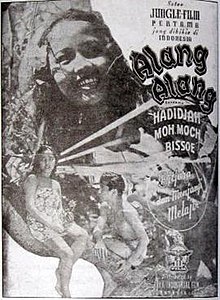
Tan's Film was a film production house in the Dutch East Indies. Established by the brothers Tan Khoen Yauw and Tan Khoen Hian on September 1, 1929, its films were mostly targeted at native ethnic groups. Starting with Njai Dasima in 1929, the company released fifteen movies before ultimately being dissolved after the Japanese occupation. The Tans and the Wong brothers established Tan & Wong Bros in 1948 to continue this work.

Pareh, released internationally as Pareh, Song of the Rice, is a 1936 film from the Dutch East Indies. Directed by the Dutchmen Albert Balink and Mannus Franken, it featured an amateur native cast and starred Raden Mochtar and Soekarsih. The story follows the forbidden love between a fisherman and a farmer's daughter.

Hajji Raden Mochtar, often credited as Rd Mochtar, was an Indonesian actor. Of noble descent, Mochtar was discovered by Albert Balink and first cast in the commercial failure Pareh (1936). Rising to popularity after the release of Terang Boelan the following year, he spent nearly sixty years in film, while also becoming a businessman and farmer.

Terang Boelan is a 1937 film from the Dutch East Indies. Written by Saeroen, directed by Albert Balink, and starring Rd Mochtar, Roekiah and Eddie T. Effendi, Terang Boelan follows two lovers who elope after one is almost forced to marry an opium smuggler. The film was shot in the Indies and Singapore, and was partially inspired by the 1936 Hollywood film The Jungle Princess. It was aimed at native audiences and included keroncong music, which was popular at the time, and several actors from Balink's previous work Pareh (1936).
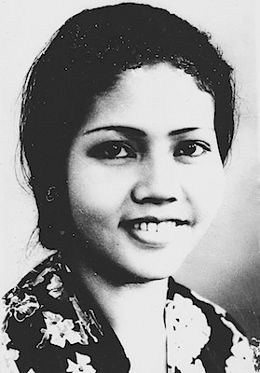
Roekiah, often credited as Miss Roekiah, was an Indonesian kroncong singer and actress. The daughter of two stage performers, she began her career at the age of seven; by 1932 she had become well known in Batavia, Dutch East Indies, as a singer and stage actress. Around this time she met Kartolo, whom she married in 1934. The two acted in the 1937 hit film Terang Boelan, in which Roekiah and Rd Mochtar played young lovers.
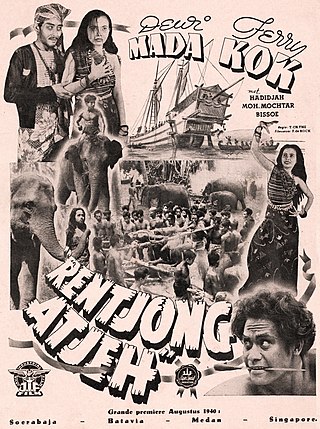
Rentjong Atjeh is a 1940 action film from the Dutch East Indies directed by The Teng Chun. Telling of a group who take revenge against pirates in the Strait of Malacca, it starred Ferry Kock, Dewi Mada, Bissoe, Mohammad Mochtar, and Hadidjah. It was filmed near the shore in Batavia and reused footage from The's earlier work Alang-Alang (1939). Rentjong Atjeh, inspired in part by the Tarzan films, was a commercial success, although it may now be lost.

Roekihati is a 1940 film from the Dutch East Indies. Directed by the brothers Joshua and Othniel Wong and produced by Tan's Film, it follows a young village woman who goes to the city and encounters various difficulties. Targeted at lower-class audiences, it was shot in black-and-white and starred Roekiah and Raden Djoemala.
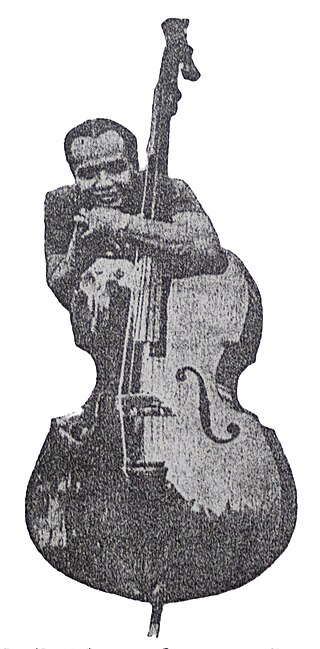
Raden Mas Kartolo was an Indonesian actor and songwriter. Born in Yogyakarta to a noble family, he entered the theatre and married the actress Roekiah around 1933. The two, living in Batavia acted in numerous movies together, starting with the 1938 hit Terang Boelan. However, Roekiah was always cast with other actors as her romantic interest. After Roekiah died in 1945, Kartolo brought the family to Yogyakarta and worked with Radio Republik Indonesia until his death. One of his sons, Rachmat Kartolo, went on to be an actor in the 1960s and 1970s.
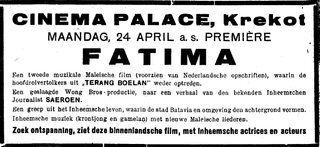
Fatima is a 1938 film from the Dutch East Indies directed by Othniel and Joshua Wong. Written by Saeroen, it starred Roekiah, Rd Mochtar, and ET Effendi and followed two lovers who are disturbed by a rich youth. The film followed the same formula as the earlier hit Terang Boelan, and saw commercial success domestically. It is one of three films which Misbach Yusa Biran credits with reviving the domestic film industry, which had been faltering.

Gagak Item is a 1939 bandit film from the Dutch East Indies directed by Joshua and Othniel Wong for Tan's Film. Starring Rd Mochtar, Roekiah, and Eddy T. Effendi, it follows a masked man known only as "Gagak Item". The black-and-white film, which featured the cast and crew from the 1937 hit Terang Boelan, was a commercial success and received positive reviews upon release. It is likely lost.
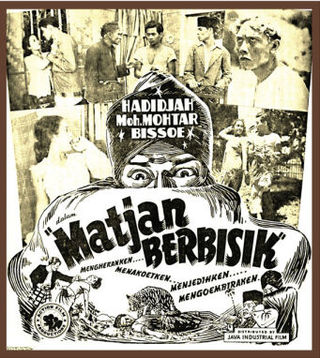
Matjan Berbisik is a 1940 film from the Dutch East Indies which was directed by Tan Tjoei Hock and produced by The Teng Chun. Starring Hadidjah and Mohamad Mochtar, the film follows two men who are raised as brothers and compete for the love of the same woman. A copy of the black-and-white film, which featured keroncong music, is stored at Sinematek Indonesia.

Srigala Item is a 1941 film from the Dutch East Indies that was directed by Tan Tjoei Hock and produced by The Teng Chun for Action Film. Starring Hadidjah, Mohamad Mochtar, and Tan Tjeng Bok, the film's plot – inspired by Zorro – follows a young man who became a masked vigilante to take revenge against his conniving uncle. Srigala Item was a commercial success, which Misbach Yusa Biran credits to the plot's use for escapism. A copy of the black-and-white film, which featured kroncong music, is stored at Sinematek Indonesia.

Sorga Ka Toedjoe is a 1940 film from the Dutch East Indies directed by Joshua and Othniel Wong for Tan's Film. It follows an older couple who are reunited by another, younger couple after years of separation. The black-and-white film, the first production by Tan's Film after the departure of Rd Mochtar, featured kroncong music and was targeted at lower-class native audiences. It was a commercial and critical success. Roekiah and Djoemala took leading roles in three more films before Tan's closed in 1942. Sorga Ka Toedjoe is now thought lost.

Bengawan Solo is a now-lost 1949 film from what is now Indonesia. Directed by Jo An Djan, it starred Sofia WD, Rd Mochtar, and Mohamad Mochtar.

Roesia si Pengkor, also known as Hadji Saleh, is a 1939 film from the Dutch East Indies which was directed and produced by The Teng Chun for his Java Industrial Films. Starring Da'ing, Bissu, and Hadidjah, this black-and-white film followed a young woman who is saved from deceptive suitors by her beloved and a man known as "Si Pengkor".

Hadidjah was an Indonesian film actress best known for partnership with Moh Mochtar in seven films released by Java Industrial Film between 1939 and 1941. She was the mother of Citra Award-winning musician Idris Sardi.

Si Gomar is a 1941 film from the Dutch East Indies which was written and directed by Tan Tjoei Hock and produced by The Teng Chun. Starring Hadidjah, Mohamad Mochtar, and Tan Tjeng Bok, the movie follows a brother and sister who are separated by robbers and almost marry before their cousin recognises them.
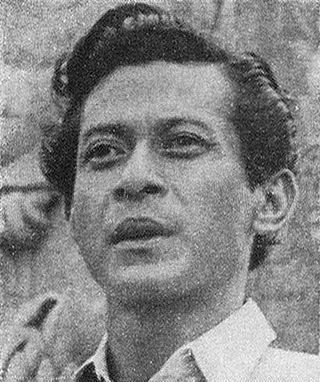
Mohamad Mochtar, usually credited as Moh Mochtar, was an Indonesian film actor active from 1939 until his death in 1981.

Mas Sardi was an Indonesian composer and musician notable for being the country's first professional music supervisor. He and his wife Hadidjah were the parents of Citra Award-winning musician Idris Sardi.
Singa Laoet is a 1941 film from the Dutch East Indies. Directed by Tan Tjoei Hock and produced by The Teng Chun, it starred Tan Tjen Bok, Mohamad Mochtar, and Hadidjah.
